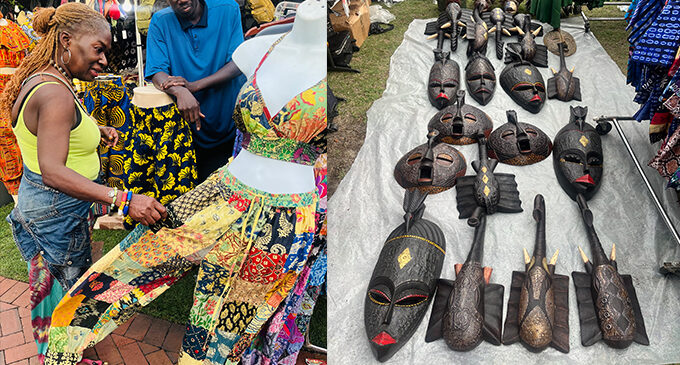The Original Gullah Festival 2024 attracts hundreds to Beaufort, SC, for the Memorial Day weekend

By Felecia Piggott-Long, Ph.D.
More than 15 friends and relatives from Winston-Salem met up with one another at the Original Gullah Festival in Beaufort, South Carolina, during the Memorial Day weekend from Friday, May 24 – Sunday, May 26. Hundreds of African Americans and other creeds and cultures gathered at this family-oriented event which included a dramatic musical called “Decoration Day” by Anita Singleton Prather and Gullah kinfolk, workshops, performances from choirs, Sunday church service, exhibits, an historical walk-through, a vendor’s market with arts and crafts, and a food court filled with local cuisine and Gullah favorites.
Lectures and workshops included Gullah history and culture, musical instrument making, quilt making, sweetgrass basket weaving, and Sankofa Circles for discussion. Regina Woodberry made her third trip to the festival in May with her friend Norma Corley, who went for the first time. Ralph Fisher and his wife Olivia Fisher reconnected during the gathering. Some of their relatives and friends joined them at various activities. They spent time with Cheryl Johnson from Winston-Salem during the festival.
“This is my third time coming to the Gullah Festival, and I plan to make my way back next year. There is so much to see and learn. This trip is all about our history and how the West Africans were captured and brought here along the East Coast and the suffering they had to endure,” said Woodberry. “They were forced out of their homeland, and it has not been easy trying to keep the culture thriving.”
Woodberry particularly loved watching the musical “Decoration Day,” which records the history of the fallen soldiers of the Civil War, the Emancipation Proclamation and how far African Americans have come over the years to the present.
Norma Corley visited the festival for the first time this year. She enjoyed watching the school bands perform together and the choirs singing as well. “I thoroughly enjoyed the musical ‘Decoration Day.’ It explains how our ancestors were enjoying life in their homeland before they were snatched away from the Motherland. The lady who played the role of Aunt Pearlie preached at the end about the need to save our land as a legacy,” said Corley.
Ralph Fisher was glad that he decided to attend the Gullah Festival this year with his wife Olivia. “I attended the Gullah Cultural Arts Festival in Beaufort, South Carolina, this weekend. It was my first time, but it won’t be the last time,” Fisher said. “It was a culturally-awakening experience. They need to teach this matter in our public schools.
“We arrived on Saturday, and we were in tears when they commemorated the original point of entry for the enslaved,” said Fisher. “For time purposes, a silent prayer of your choice and the joining of hands was done for others, and water was poured for libations.”
General Rebert Smalls, an American politician, publisher, businessman and maritime pilot was born into slavery in Beaufort, South Carolina. He freed himself, his crew and their families during the Civil War by commandeering a confederate transport ship known as the CSS Planter in Charleston Harbor on May 13, 1862. A bust of this general stands in Beaufort.
The Harriet Tubman Monument was unveiled on the grounds of the Tabernacle Baptist Church in Beaufort, where the members created a historical walk-through titled “Lest We Forget.” Several exhibitions, books, and photographs were included in this display.
Rev. Isaiah Smalls, pastor of Friendship Baptist Church, delivered the morning sermon for Sunday worship titled “Still Believing, Still Praying, Still Standing.”
The original Gullah Festival was founded in 1985 to celebrate the Gullah Culture through education, art, entertainment, storytelling, dancing, the sounds of jazz, blues, reggae, gospel choirs, Negro spirituals, African drums, Gullah rappers, and food. Who are the Gullah? The Gullah/Geechee people are descendants of enslaved Africans from various ethnic groups of West Africa and Central Africa who were captured and brought to work on the plantations of coastal North Carolina, South Carolina, Georgia and Florida.
The Gullah/Geechee language or dialect as many people know it, is one of the purest residuals from the Motherland. It uses African syntax and American diction. They have retained many aspects of their African heritage due to geographic barriers of the coastal landscape. According to the National Park Service Special Resource Study, the Gullah/Geechee Cultural Heritage Corridor extends from Wilmington, North Carolina, to St. Augustine, Florida.
For more information, email info@originalgullahfestoval.org or call 843-605-5357 or 843-321-9288.









